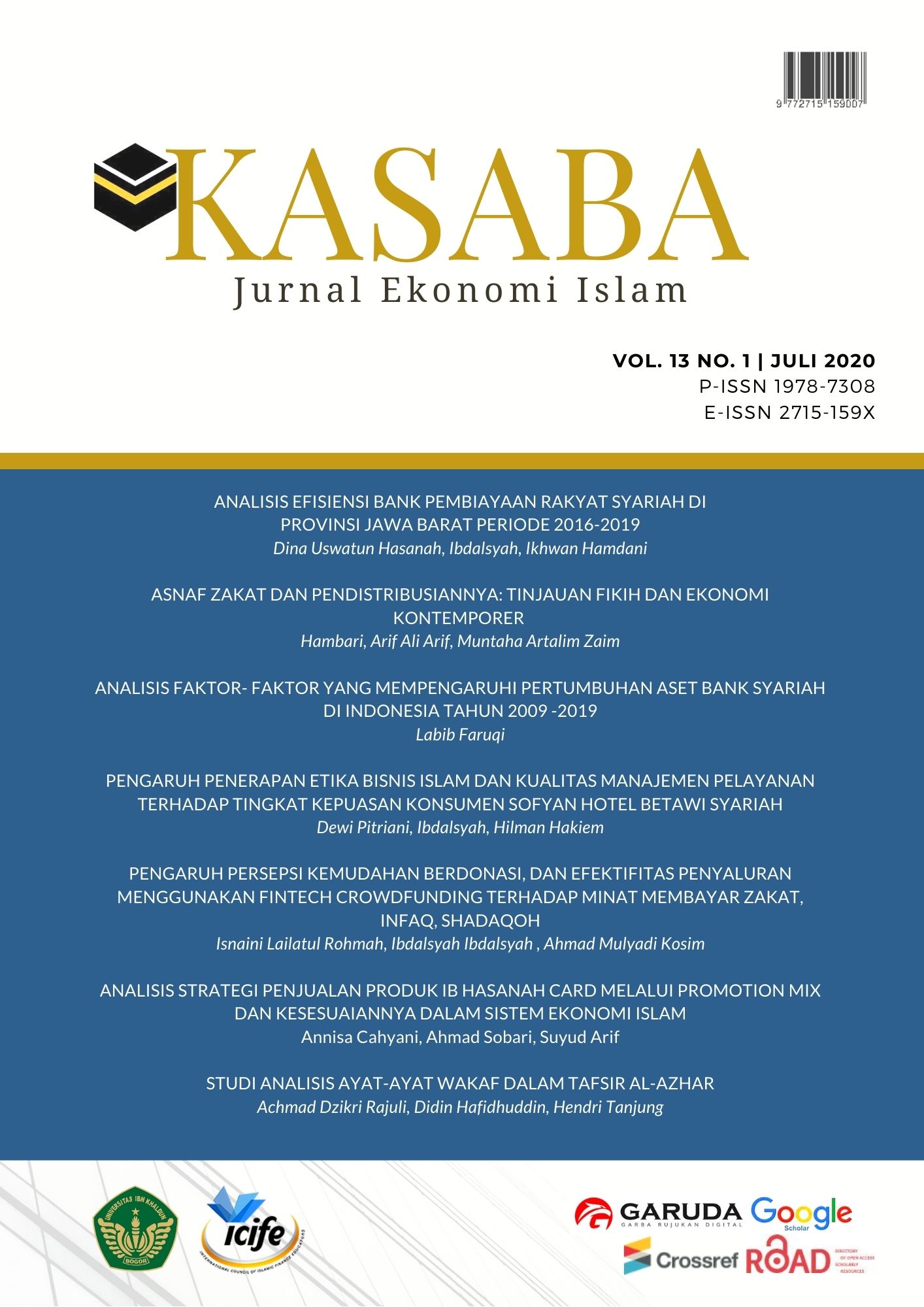ASNAF ZAKAT DAN PENDISTRIBUSIANNYA: TINJAUAN FIKIH DAN EKONOMI KONTEMPORER
DOI:
https://doi.org/10.32832/kasaba.v13i1.3393Keywords:
Zakat, Distribution, Islamic JurisprudenceAbstract
As the third pillar of Islam, zakat should be considered as one of the main concerned areas for Muslims. Zakat is believed to be able to have an impact on society in terms of economic, educational, and social aspects. One of the indicators of the success of zakat distribution is its impact on reducing the poverty rate, empowering economic conditions, and improving the well-being of its beneficiaries. According to Quran At Taubah verse 60 and 103, the recipients of zakat fund has been determined and the payment of zakat fund should be made through transparent, trustworthy, and professional zakat institutions. This shows the importance of zakat distribution that should be in line with Islamic law as well as a formal regulation. This study, hence, attempts to examine the eight groups who are eligible to receive zakat funds from the perspectives of Islamic jurisprudence and contemporary economic analysis. This study employs a descriptive analysis method from secondary data including classical and contemporary references. This study also provides some recommendations for zakat institutions with respect to the zakat distribution programs.References
Al-Qardawi, Yusuf. 1981. Fiqh Al-Zakah. Beirut: Muassasah Al-Risalah.
Asnaini, (2008). Zakat Produktif dalam Perspektif Islam, Yogyakarta: Pustaka Pelajar.
Ayuniyyah, Qurroh. (2019). The Role of Zakat in Poverty Alleviation and Income Inequality Reduction: A Case Study of West Java, Indonesia. Disertasi PhD: International Islamic University Malaysia.
Az Zuhaily, Wahbah. (2005). Zakat Berbagai Mazhab, Bandung: PT. Pustaka Remaja.
Az Zuhaily, Wahbah. (1991). Fiqh Islam wa Adillatuhu. Damascus: Darul Fikr.
BAZNAS, (2014). Profil BAZNAS dan Pengelolaan Zakat Nasional, Jakarta: Baznas.
Beik, Irfan Syauqi. 2019. Kebijakan Pendistribusian dan Pendayagunaan BAZNAS. Riau: Rakorda BAZNAS Riau.
Beik, Irfan Syauqi (2013). Economic Role of Zakat in Reducing Poverty and Income Inequality: A Case Study in the Province of DKI Jakarta, Indonesia. Germany: Lambert Academic Publishing.
Beik, I. S. and Ayuniyyah, Q. 2015. Fiqh of asnaf in the distribution of zakat: Case study of the national board of zakat of Indonesia (BAZNAS). Al-Infaq Jurnal Ekonomi Islam, 6(2), 201-216.
Hafidhuddin, Didin, M. Fuad Nasar, Teten Kustiawan, Irfan Syauqi Beik, dan Hilman Hakiem. (2013). Fiqh Zakat Indonesia. Jakarta: BAZNAS.
Hafidhuddin, Didin. 2004. Zakat Dalam Perekonomian Modern. Jakarta: Gema Insani Press.
Hambari. 2017. Zakat Al-Sharikat fi Indunisia. The 6th International Conference on Islamic Jurisprudence, Kuala Lumpur: Department of Fiqh and Usul Al-Fiqh, International Islamic University Malaysia.
Hud, Muhammad Shalih. 2006. Al-Nizam Al-Alami Lil-Zakah: Ru'yat Mustaqbaliyyat Litaf'il Al-Daur Al-Iqtisadi wa Al-Ijtima'i Li Al-Zakah. Riyadh: Al-Maktabah Al-Malik Al-Fahd Al-Wataniyah.
Kahf, Monzer. 1995. Applied Institutional Models for Zakah Collection and Distribution in Islamic Countries and Communities, Institutional Framework of Zakah: Dimensions and Implications. Jeddah: Islamic Research and Training Institute, Islamic Development Bank.
PUSKAS BAZNAS. (2017) Sebuah Kajian Zakat on SDGs, Jakarta.
Downloads
Published
How to Cite
Issue
Section
License
Penulis memberikan hak cipta karyanya kepada jurnal yang dilisensikan di bawah Lisensi Atribusi Creative Commons yang memungkinkan orang lain untuk menggunakan karya dengan pengakuan kepengarangan karya dan publikasi awal dalam jurnal ini.





